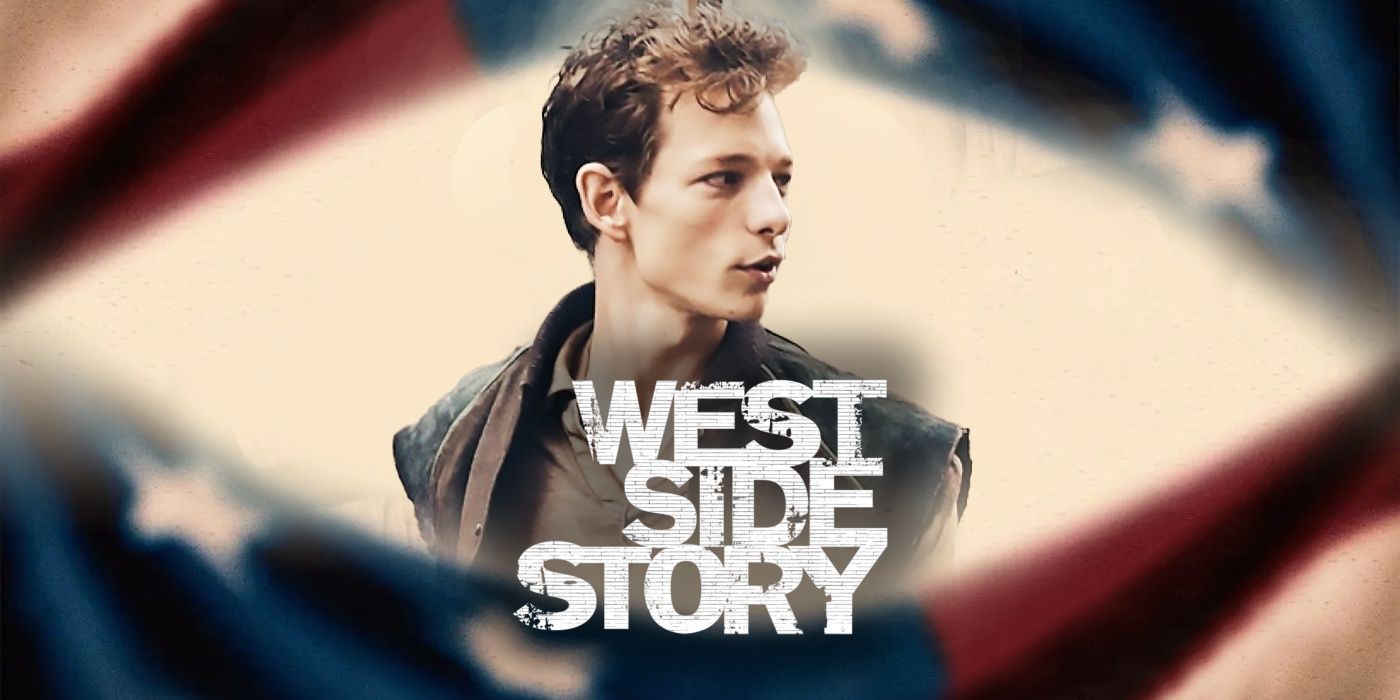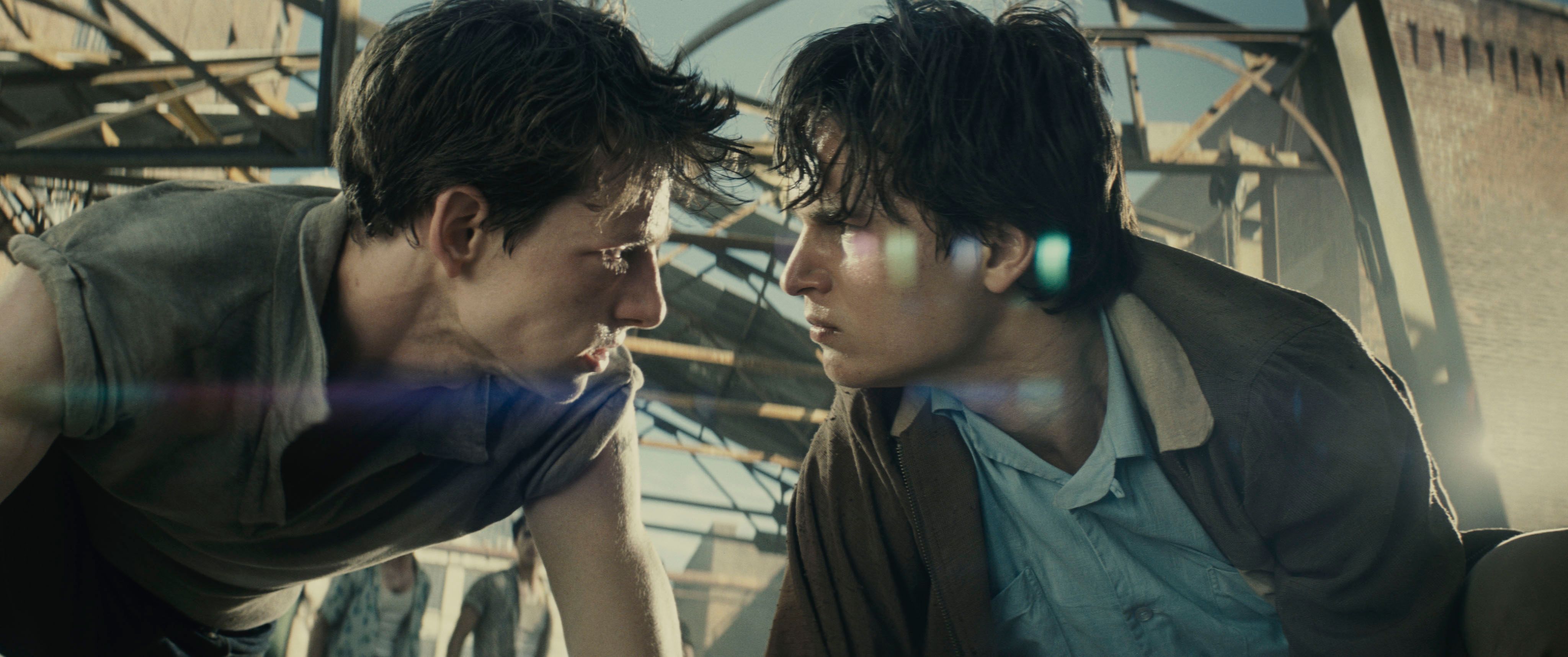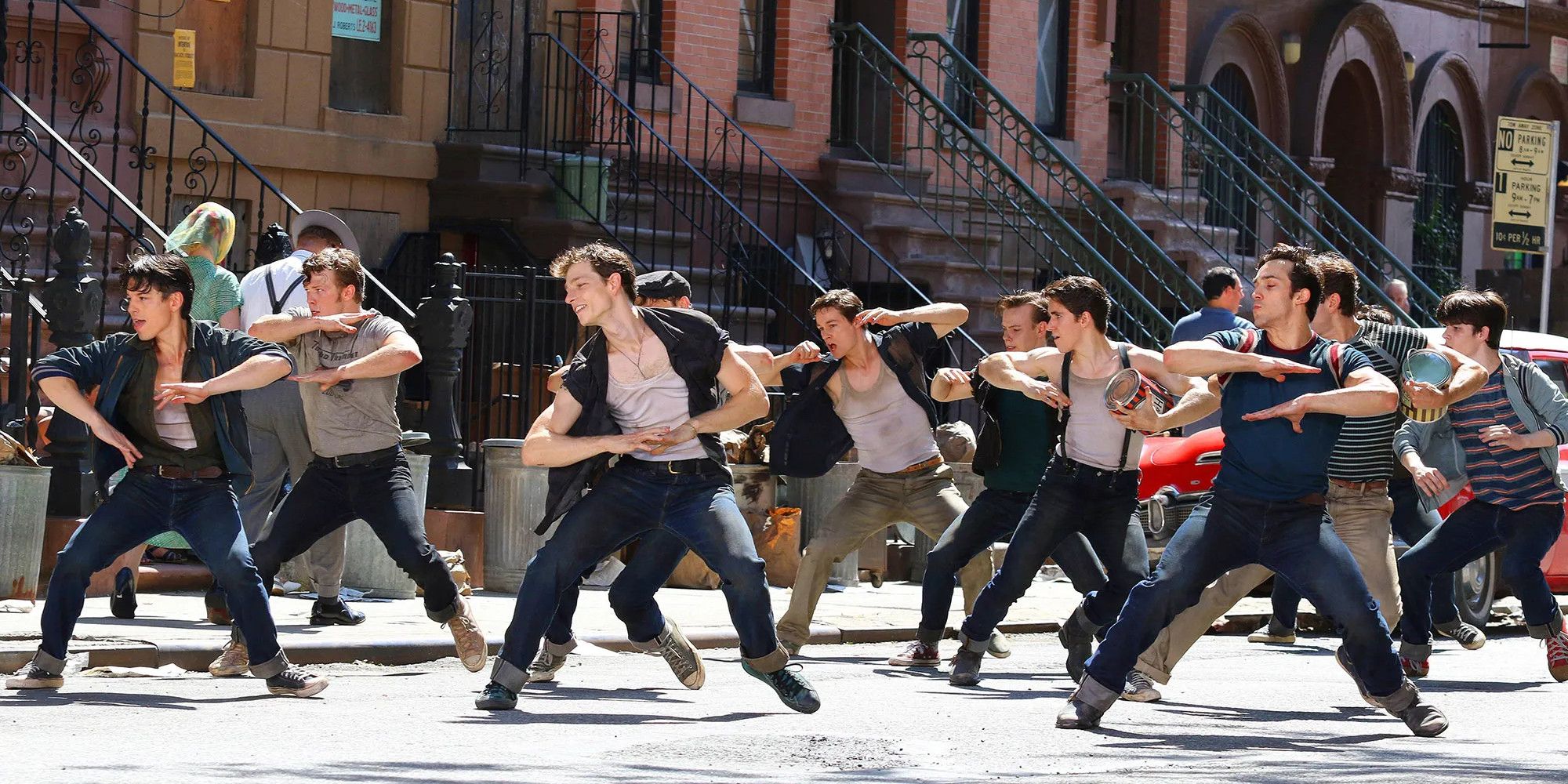This article contains spoilers for West Side Story (2021).In the conflict of West Side Story, the Jets have always been the side that leans more towards being the antagonists, even though the story ultimately aims to reinforce that both sides are guilty of engaging in the hatred that leads to so much senseless violence. Though the Jets are the aggressors in much of the fights in the story, how much culpability they’re given varies through different adaptations. Steven Spielberg’s new adaptation of West Side Story, however, chooses to lean further into the narrative of the Jets as the central wrongdoers in the conflict and portrays them in a much more negative light than in previous versions.
In the 2021 West Side Story, the Sharks are fighting because they have to in order to carve a place for themselves, in contrast to the Jets who fight because they feel they can do nothing else. In contrast to the Sharks, the Jets (and their leader Riff in particular) are more lowly in this version, making the audience understand why they are the way they are. Yet the narrative doesn’t excuse the choices they made and the hurt they cause. The Jets are clearly portrayed as the worst group out of the two, and the narrative reinforces this again and again by telling how they could be better but actively choose not to, and that is nobody else’s fault but their own.
Originally Riff’s character centered around being the prideful leader of the Jets, with him fighting because of the prejudice he held for the Sharks. However, in this version, a new element has been added to his character motivations: Fear. Because the upper west side is facing the threat of gentrification, the struggle for territory between the Jets and the Sharks now reads as a desperate bid to hold onto whatever they can while everything crumbles around the Jets and the Sharks. In this version, a specific emphasis is placed on how Riff feels like he has nothing left besides the Jets, and this is further exacerbated by the fact that the area he calls home is slowly being taken by forces outside of his control, but the Sharks are the easier target and thus become the subject of his aggression and desperation for power. For Riff, acting out on his racist ideology against the Puerto Rican immigrants is easier than actually facing his own problems and the rest of the world around him.
In the beginning of the film we see Riff run away multiple times from any situation that could force him to reflect on himself and who he has become, but he covers it up with a too-cool attitude to make himself feel like he isn’t running. After the first fight between the Jets and the Sharks is broken up in the opening number, Lieutenant Schrank starts scolding the Jets and questioning why they don’t do what every other white person has done in this area before them and work their way to a better life. He tries to drill into them that once this area is bulldozed down to build luxury apartments and a performing arts center, the Jets will truly have nothing left while the Sharks will have moved on to other jobs. Riff subtly deflects this though with a joke about Schrank’s name, not wanting to think about the possibility any longer than he has to.
Then, in the next scene where he’s trying to convince Tony to back up the Jets at the upcoming dance, Tony explains that while he was in prison during the last year he did a lot of self-reflection and realized he was scared of the person he had become back then, and the hurt he had caused. Instead, Tony is now trying to focus on becoming a better person, and during this moment the camera locks onto Riff, and as Tony talks about his fear of what he’s capable of, the brightest thing in the shot is Riff’s eyes and the slow panic that builds in them before he brushes off Tony’s advice by saying Tony has gotten too introspective for him now. Mike Faist specifically highlights the fear that Riff is feeling, giving a layered and multidimensional performance not seen in prior versions of the character. Riff tries to leave as quickly as possible, giving up on the conversation with Tony because it has quickly become too real for him.
Throughout the film Riff continually refuses to even consider why he feels the need to act out like he does or any alternative paths he could take instead because staying in the familiarity of deflection, aggression, and hatred is easier. We slowly see Riff become more and more unhinged, digging himself further and further into hopeless territory. He ends up buying the gun because he is so sure of the fact that the Sharks will bring their own weapons and thus he doesn’t want to appear weak. He puts on a show of power when buying it, putting his forehead directly to the barrel to prove that he can handle it when confronted with the notion that it is loaded and could be fired at any moment.
Later, when Tony confronts him for the gun and tries to talk him out of participating in the rumble, Riff doubles down on both of his decisions and fully commits to fighting Tony for it in the musical sequence for “Cool.” His decisions become more and more reckless, the further he places himself into this persona he’s created, the harder it becomes to turn back. Riff is so desperate for any semblance of control or power in his life that he continually makes every wrong decision because he’s become so blinded by his desperation, and the audience has no choice but to watch him slowly ruin what's left of his own life until he pays for it with his death.
Riff is never shown to be in the right in the conflict, he starts unnecessary conflicts and escalates it, and while the audience can understand his motivations and see his thought process as it plays out, he remains the antagonist of the story because of his provocation. Riff is shown to be startlingly human in this adaptation but in all the worst ways possible. Faist's portrayal of Riff is brutal and raw, and this version of Riff is teetering on the point of no return while also being unafraid of falling. Riff went from a cartoonish villain who is prideful for the sake of being prideful, to someone audiences could know in their own lives: a man who feels so powerless in his own life that he chooses to lash out at anything around him that even mildly threatens his already crumbling security. In this version of the story, Riff and the Jets refuse to think about the implications of their situation whereas the Sharks brutally acknowledge it and try to move past it to something better.
The Jets as a whole are portrayed in a much more self-deprecating light in the film, especially in comparison to the Sharks, and this is none more prevalent than in the contrast between the two songs “Gee, Officer Krupke” and “America.” “Gee, Officer Krupke” is a comedy musical number where the Jets poke fun at the excuses they give the police as to why they act out, very much not taking themselves seriously. They talk about how their home lives are terrible and they never received the love they needed to be contributing members to society, and they joke about the insults that have been hurled at them, from being delinquents to having a “social disease” or being “psychologically disturbed.” It is a fun and bombastic number that clearly illustrates how the Jets refuse to take themselves seriously, much to the detriment of everyone around them, and they won’t do anything that could improve their situation or place them on a more productive life path.
By contrast, “America” is the central song for the Sharks and focuses on the contrast between the hope that immigrating to America holds for them and the prejudices and struggles that they face when living here. For them, America is a place where they can be given more opportunities and they can find support in each other and their community, even as the system does its best to work against them and keep them down. Living in the upper west side is difficult, but at least they have the potential to make new lives for themselves and their families here. The Sharks are always focusing on trying to work their way up to a better life, especially when placed in contrast to the Jets.
Multiple times throughout the film Bernardo points out that the Sharks don’t have time for the gang fighting because they’ve all got jobs and work to do, and Maria points out the same thing when Tony is trying to meet up with her at another point in the film. To them, gang violence is something they have to participate in as self-defense. In this version of West Side Story, the focus around the Jets is that they have nothing besides each other, and they’ve accepted this and given up on trying anything else. Meanwhile, the focus around the Sharks is the potential of the future and doing what they can to have a better life. The Sharks are always looking forward, while the Jets are refusing to look anywhere besides the present, to the detriment of themselves and everyone around them.
Riff's choices are clearly coded negatively throughout the film, even if the reasoning behind them is obvious and can even make audiences feel bad for him. However Riff, and by extension, the Jets, are shown again and again that their mentality of thinking they have nothing else is ultimately damaging to themselves and their place in the world. In West Side Story, the Jets are shown to be lesser than the Sharks for this fact, and their dedication to the gang fights and trying to uphold their territory comes across as almost pitiable. It is clear why the Jets do what they do, but it is reinforced over and over through the perspective of other characters that the situation they're in is entirely their own fault. Even if violence is a two-way street, their tendency to fall back on the toxic mentality and racist ideology that constitutes their gang place them squarely as the antagonists in this version of the story.




.jpg)